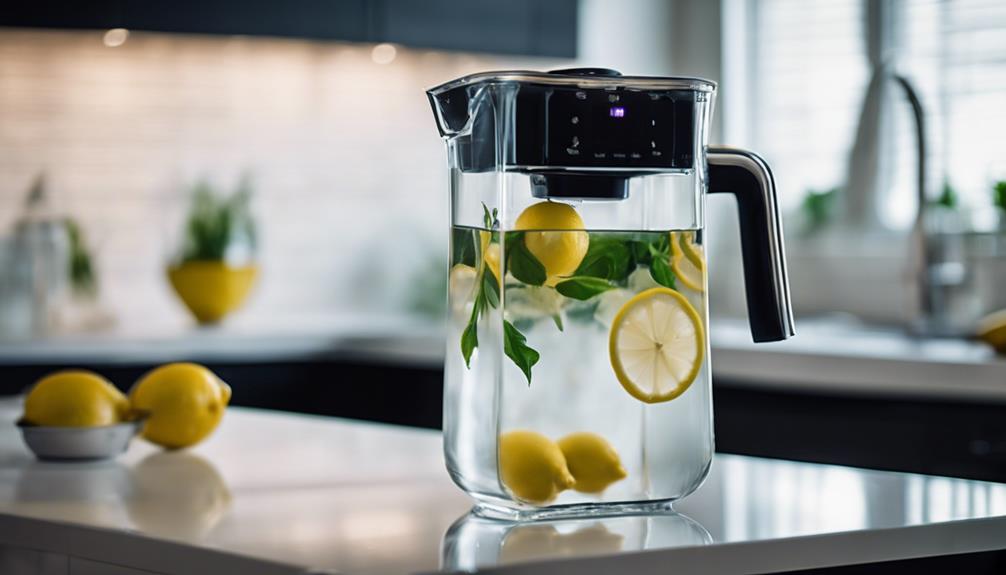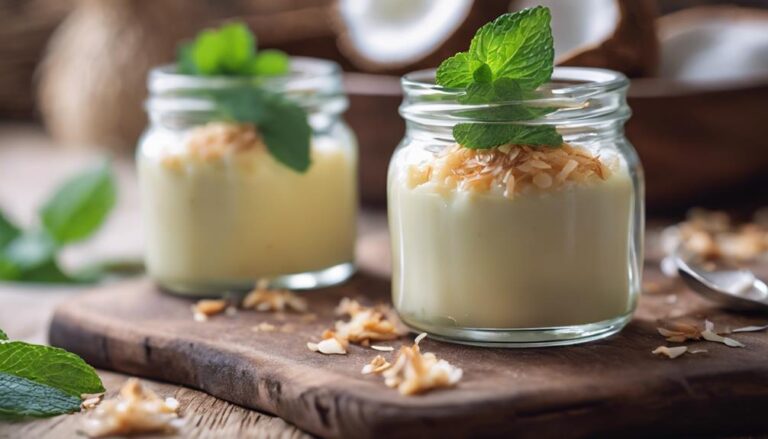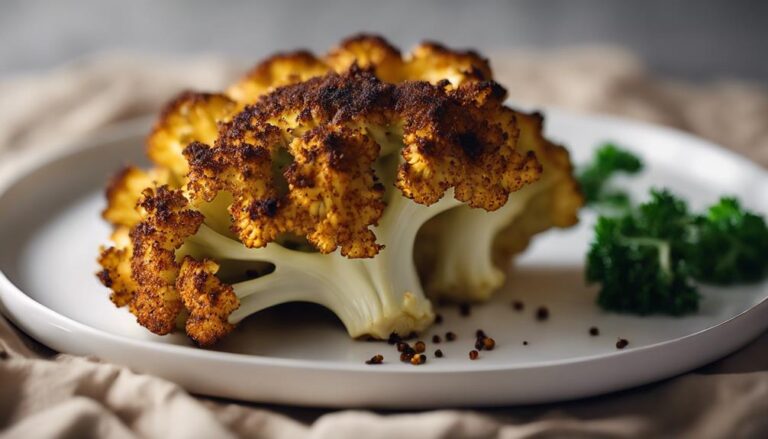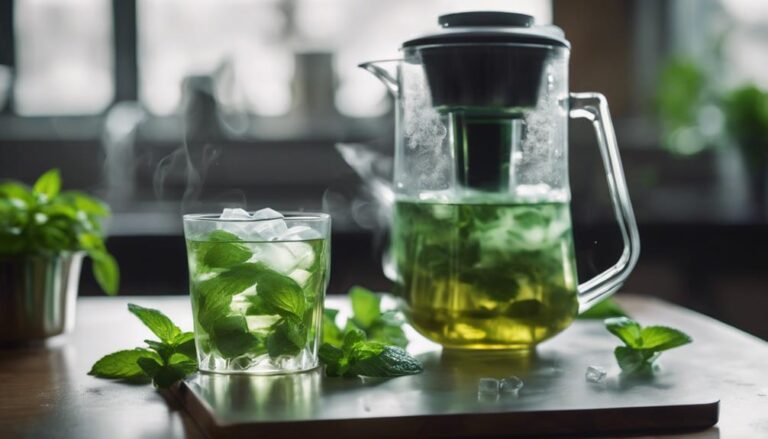Sous Vide Infused Lemon Water
Enhance your hydration with a flavorful twist in sous vide infused lemon water. Experience a unique and invigorating beverage, crafted with precision infusion technology for a perfectly balanced taste. The infusion process guarantees a burst of revitalizing lemon flavor, complemented by herbal notes. Elevate your hydration routine with this distinctive lemon thyme infusion that promises a redefined lemon water experience.
What You Will Learn Here
- Precision infusion process ensures thorough flavor release
- Lemon slices and thyme enhance taste profile
- Unique twist on classic lemon water
- Aromatic infusion for a refreshing experience
- Well-balanced and invigorating beverage
Lemon's Historical Culinary Significance
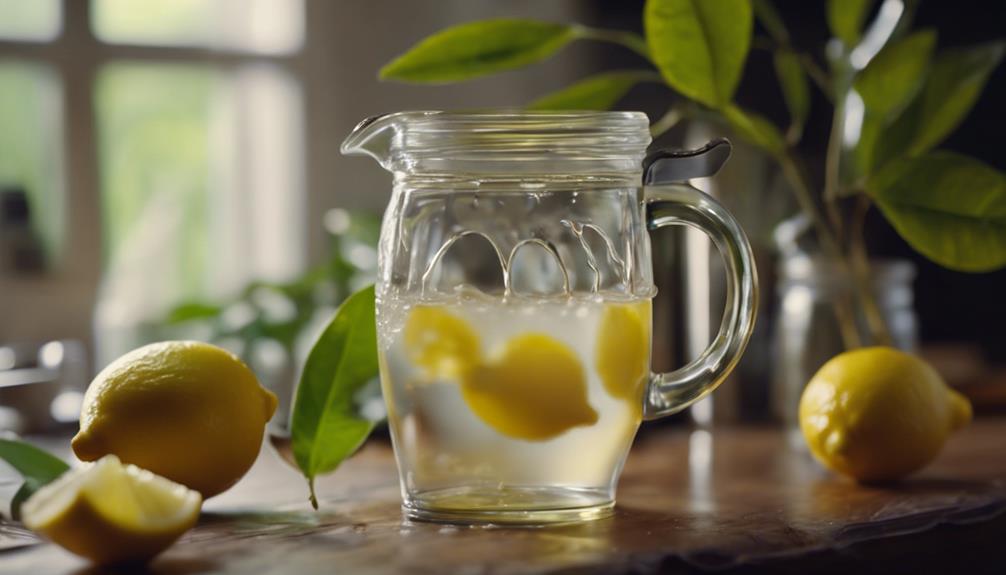
Lemons have a rich historical culinary significance, with roots dating back to ancient times. The versatility of lemons in various cuisines and mixology is attributed to their acidity and vibrant flavor profile.
Exploring culinary lemon origins, ancient uses, and modern recipes sheds light on the enduring appeal of this citrus fruit.
Culinary Lemon Origins
With a rich and storied history, the culinary importance of lemons transcends borders and time periods. Lemons have been a fundamental ingredient in Mediterranean cuisine for centuries due to their tangy flavor and versatility in various dishes. Historical records suggest that Arab traders introduced lemons to Europe during the Middle Ages, greatly impacting culinary practices in the region.
In traditional medicine, lemon water has been utilized for its alleged health benefits, such as aiding digestion and detoxification. The acidity of lemons in infused water plays a crucial role in balancing pH levels within the body and promoting hydration. By infusing lemon slices in water using sous vide techniques, the flavor extraction process is enhanced, resulting in a more intense and invigorating beverage.
Lemon in Ancient Cuisine
Exploring the historical culinary significance of lemon in ancient cuisine reveals a vital tradition of utilizing this versatile fruit to enhance flavors and preserve foods throughout various civilizations.
In ancient Rome and Greece, lemons were highly prized for their ability to add a unique and vibrant taste to dishes and drinks. The acidic and invigorating flavor of lemons played an important role in enhancing the overall culinary experience, making them a valuable ingredient in ancient recipes.
Lemons weren't only used for their taste but also for their medicinal properties, adding a revitalizing and tangy dimension to a wide range of cuisines throughout history. The historical use of lemons showcases their enduring appeal and importance in ancient culinary practices.
Modern Lemon Recipes
Delving into contemporary culinary practices, the infusion of lemon into various recipes continues to showcase its enduring influence on modern gastronomy. By utilizing sous vide technology, chefs can enhance the flavor of lemon water to create a more intense and consistent citrus experience. The precise control offered by sous vide guarantees a thorough infusion process, resulting in a revitalizing and flavorful beverage. Modern recipes often incorporate lemon-infused water as a versatile ingredient that adds a tangy twist to both cooking and beverage preparation. This innovation highlights the adaptability of lemons in culinary creations, proving that their zesty and hydrating properties are timeless.
| Lemon Water Benefits | Sous Vide Infusion | Modern Recipes |
|---|---|---|
| Hydrating | Precise control | Tangy twist |
| Detoxifying | Intensified flavor | Revitalizing |
| Revitalizing | Consistent outcome | Versatile |
Lemon Zest for Flavor
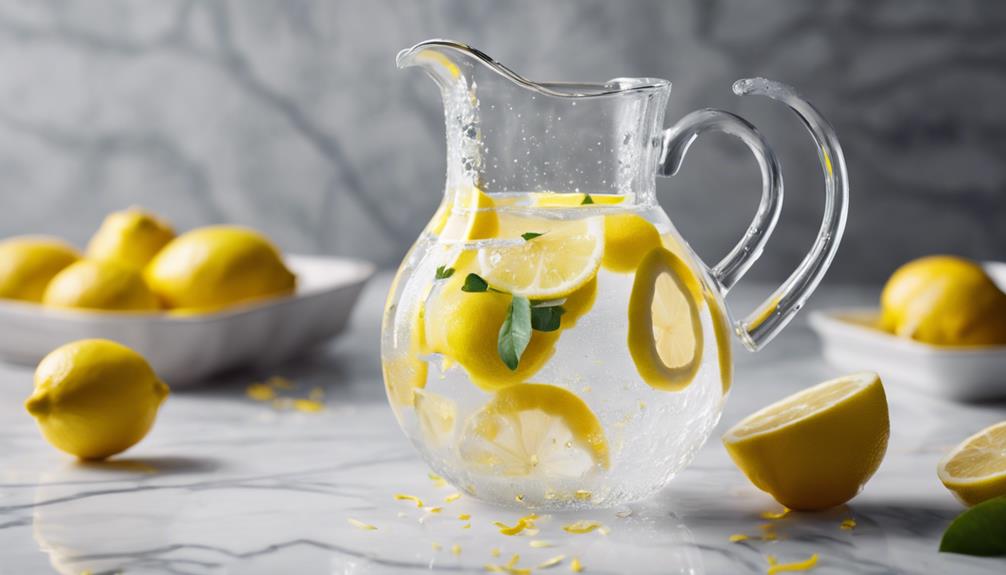
To enhance the flavor profile of your Sous Vide Infused Lemon Water, contemplate incorporating the vibrant essence of lemon zest, known for its concentrated citrus notes and essential oils. Lemon zest is derived from the outer yellow part of the lemon peel, which is rich in flavor and versatile for use in a variety of recipes.
Here are some key points to ponder about using lemon zest for flavor:
- Lemon zest adds a concentrated citrus flavor to dishes.
- It contains essential oils that provide a bright and invigorating taste.
- The outer yellow part of the lemon peel is rich in flavor.
- Lemon zest is a versatile ingredient used in both sweet and savory recipes.
Lemon Infused Oil Varieties
When considering Lemon Infused Oil Varieties, it's essential to explore the versatility of lemon-infused vinaigrette, body scrub, and tea blends.
Each variety offers a unique way to incorporate the citrusy essence into different aspects of your culinary and self-care routines.
Experimenting with these lemon-infused oil options can elevate your dishes and pampering rituals.
Lemon-Infused Vinaigrette Recipe
For a invigorating burst of flavor in your salads and dishes, consider infusing your vinaigrette with lemon zest and your preferred oil variety. When making a lemon-infused vinaigrette, the infusion process involves combining lemon zest with oils like olive oil, avocado oil, or grape seed oil and letting it steep. This versatile dressing can be customized with herbs, spices, or additional citrus fruits to suit your taste preferences. Lemon-infused vinaigrette adds a zesty and citrusy flavor to your culinary creations, perfect for use as a marinade, drizzle, or dipping sauce. Experiment with different combinations to find the perfect blend that enhances your dishes with a invigorating and tangy twist.
- Zesty Flavor: Lemon zest adds a vibrant and citrusy taste to the vinaigrette.
- Oil Options: Choose from olive oil, avocado oil, or grape seed oil for the infusion.
- Customizable: Personalize your vinaigrette with herbs, spices, or additional citrus fruits.
- Versatile Usage: Use the lemon-infused vinaigrette as a marinade, drizzle, or dipping sauce.
Lemon-Infused Body Scrub
Consider exploring various lemon-infused oil varieties for your homemade lemon-infused body scrub to enhance its exfoliating and nourishing properties. Lemon-infused oils can bring additional benefits to your body scrub due to their rich properties. Here are some lemon-infused oil varieties to explore:
- Lemon Verbena Oil: Known for its soothing and calming effects on the skin.
- Lemon Eucalyptus Oil: Offers an invigorating and revitalizing scent while providing antibacterial properties.
- Lemon Tea Tree Oil: Helps with acne-prone skin and has antifungal properties.
- Lemon Geranium Oil: Provides balancing effects on the skin's natural oils and promotes a healthy glow.
Experimenting with these lemon-infused oil varieties can elevate your body scrub, making it a luxurious and effective addition to your skincare routine.
Lemon-Infused Tea Blend
To explore the diverse flavors of lemon-infused tea blends, experiment with various lemon-infused oil varieties that can elevate your tea-drinking experience. When selecting lemon-infused oils for your tea blends, consider the following options:
- Lemon-Infused Olive Oil: Adds a rich and fruity flavor to your tea, complementing the citrus notes.
- Lemon-Infused Coconut Oil: Provides a subtle tropical twist to your tea, perfect for enhancing herbal blends.
- Lemon-Infused Avocado Oil: Offers a creamy texture and a mild lemon essence, ideal for green or white teas.
- Lemon-Infused Grapeseed Oil: Brings a light and delicate lemon flavor, enhancing the freshness of your tea.
Experiment with these lemon-infused oil varieties to find the perfect complement to your favorite tea blends.
Lemon Zest Storage Methods
When storing lemon zest, remember to keep it in an airtight container in the refrigerator for short-term use.
For longer storage, freezing the zest in an airtight bag or container is recommended.
To maintain zest freshness for an extended period, consider vacuum sealing it.
Zest Preservation Techniques
Preserving lemon zest can be accomplished through various methods, such as freezing, drying, immersing in sugar or salt, vacuum sealing with oil, or refrigerating in a sealed container. Each method offers unique benefits in preserving the zest's flavor and aroma. Below is a table summarizing these preservation techniques:
| Preservation Method | Duration |
|---|---|
| Freezing in airtight container | Up to 6 months |
| Drying in dehydrator or oven | Extended shelf life |
| Immersing in sugar or salt | Preserves and infuses flavors |
| Vacuum sealing with oil | Maintains freshness and aroma |
| Refrigerating in sealed container | Fresh for about 1 week |
These methods guarantee that your lemon zest stays fresh and flavorful for various culinary uses.
Long-Term Storage Options
For best preservation of lemon zest, consider utilizing a combination of storage methods to prolong its shelf life and maintain its vibrant flavor.
To maximize the longevity of your lemon zest, you can store it in an airtight container in the refrigerator for up to 2 weeks. Alternatively, freezing lemon zest in a sealed bag can extend its shelf life for up to 6 months.
Dehydrating lemon zest until crispy allows for long-term storage in a cool, dark place. Vacuum sealing lemon zest helps maintain its flavor and aroma for an extended period.
Adding a little sugar to lemon zest before storage can help sustain its freshness and flavor. These methods will ensure your lemon zest stays fresh and flavorful for longer periods, ideal for Sous Vide applications and preservation.
Freshness Maintenance Tips
To maintain the freshness of your lemon zest, employ various storage methods that preserve its flavor and aroma effectively.
Storing lemon zest in an airtight container in the refrigerator is a simple way to keep it fresh.
Freezing lemon zest in sealed bags using an Anova Sous Vide Precision machine can extend its shelf life and preserve its taste for longer periods. Vacuum-sealing lemon zest before freezing is another effective technique to prevent freezer burn and maintain quality.
If you have leftover zest, consider using dried lemon zest in spice blends or teas as a convenient storage option.
Additionally, dehydrating or air-drying lemon zest is recommended for long-term storage, ensuring it retains its citrus essence for future use.
Final Thoughts
To summarize, Sous Vide Infused Lemon Water offers a unique and flavorful twist to the classic lemon water, elevating your hydration experience with its aromatic infusion.
The precision of the sous vide method guarantees that the lemon slices and thyme release their flavors thoroughly into the water over the 1.5-hour cooking time. This precise infusion process results in a well-balanced and invigorating beverage that's bursting with invigorating lemon and herbal notes.
The addition of lemon thyme to this infused water brings a distinctive twist to the traditional lemon water recipe, enhancing the overall taste profile and aroma of the drink.
Frequently Asked Questions
Can You Infuse With Sous Vide?
Yes, you can infuse with sous vide. This method offers precise control over temperatures for ideal flavor extraction in fruit and herb infusions. It maintains ingredient integrity and nutrients while providing consistent results with minimal supervision.
What Should Not Be Sous Vide?
When considering what should not be sous vide, prioritize food safety by avoiding raw garlic, unpeeled root vegetables, and delicate herbs. Additionally, steer clear of foods that require high-heat techniques for flavor development, caramelization, or crispy textures.
What Is a Disadvantage of Sous Vide?
When considering a disadvantage of sous vide, it is crucial to recognize that time efficiency and cooking precision are areas where traditional cooking methods may outshine sous vide. These factors can impact your overall cooking experience.
What Temperature Do You Infuse Alcohol in Sous Vide?
When infusing alcohol in sous vide, aim for a temperature range of 135-140°F. This precise heat level optimizes flavor extraction from ingredients like lemon peels. Maintaining consistency during the process is key for best results in sous vide cocktails and infusing fruits.
Conclusion
Overall, sous vide infused lemon water offers a unique and invigorating twist on a classic beverage.
By using precise temperatures and sealed bags, the flavors of lemon are intensified and perfectly infused into the water.
This method allows for a consistent and controlled infusion process, ensuring a delightful and consistent taste every time.
Experimenting with different infusion times and temperatures can further enhance the citrusy essence of the lemon, creating a truly invigorating drink experience.
